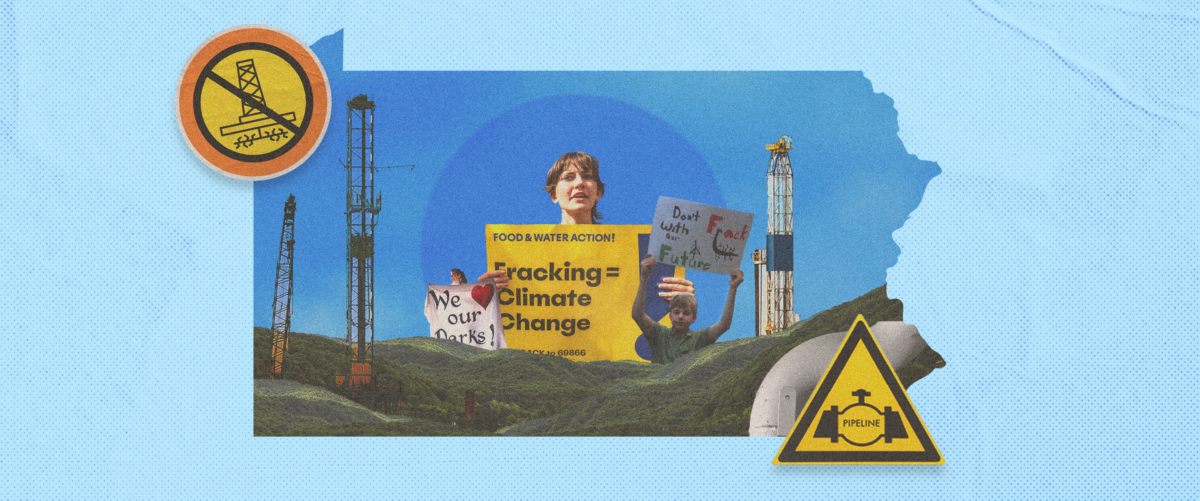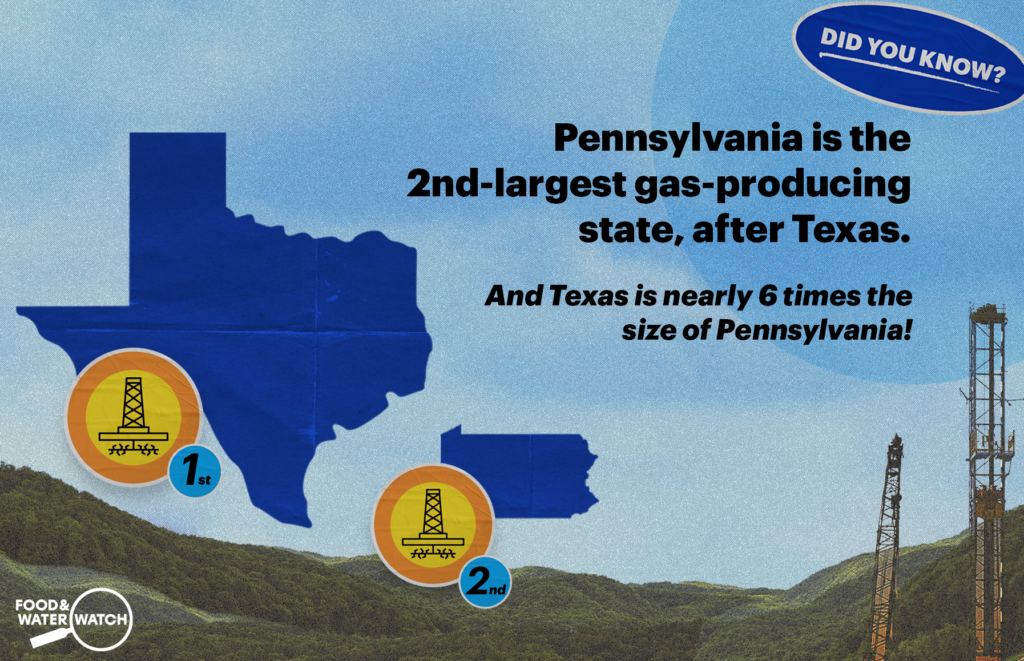The Municipal Ordinance Project: PA’s Greatest Tool to Fight Fracking
Published Jun 10, 2025

By passing protective ordinances at the local level, we're helping to MOP up the fracking mess state legislators and regulators allowed to happen under their watch.
When Pennsylvania pioneered unconventional fracking, the political and regulatory landscape was not prepared for the shale gas boom that would be unleashed across the Commonwealth.
Over two decades later, officials meant to protect people and the environment have yet to properly address the dirty, harmful gas industry. As a result, fracking corporations have run amok on millions of people’s lives, especially in Western Pennsylvania.
But while our leaders flail and frackers bend state politics, Pennsylvanians are taking matters into their own hands. With Food & Water Watch’s Municipal Ordinance Project (MOP), dozens of towns have curbed dangerous fracking.
With hard work, smart strategy, and people power, Pennsylvanians are protecting their communities and gaining even more steam. We won’t stop until all Pennsylvanians are provided their right to clean air, water, and access to a healthy environment.
Wild Western PA Puts Families at Risk from Fracking
Since the early 2000s, Western Pennsylvania has been the fracking Wild West. Oil and gas companies have and continue to operate as they pleased.
Industry has permanently polluted residential water wells and destroyed countless wetlands. It’s built well pads 500 feet (sometimes closer) from family homes, allowed uncapped gas wells to release steady streams of methane.

The absence of regulations and the subsequent harm prompted the 43rd Statewide Investigative Jury report in 2020. This two-year investigative study brought to light what impacted residents have said since fracking entered their communities: the State and its agencies meant to protect people and the environment failed to do so.
Even though the Department of Environmental Protection (DEP) and Department of Health (DOH) were singled out by name in the report, they continue to ignore Pennsylvanians into 2025. Josh Shapiro, attorney general at the time, said of the report:
It’s about the big fights we must take on to protect Pennsylvanians — to ensure that their voices are not drowned out by those with bigger wallets and better connections. There remains a profound gap between our Constitutional mandate for clean air and pure water, and the realities facing Pennsylvanians who live in the shadow of fracking giants and their investors.
But as governor, what has Shapiro done to “clean up” the DEP and DOH he presides over? Instead of making the changes he knows Pennsylvanians need, he’s spent his time in Harrisburg lifting fracking moratoriums, courting gas companies like CNX — which has over 2,000 environmental violations — and offering tax incentives for climate scams like hydrogen.
Years after the report’s release, it’s abundantly clear that promises will continue to be broken and attempts to hold violators and polluters accountable are insignificant and weak.
The Municipal Ordinance Project: Fighting Fracking at the Local Level
State officials won’t clean up the fracking mess they’ve allowed, even if they acknowledge the problem. Pennsylvania doesn’t have time to wait. We need bold solutions and big actions, and that’s why Food & Water Watch created the Municipal Ordinance Project in 2018. We’re protecting the people those in Harrisburg haven’t.
People sometimes don’t understand how critical their local governments are. Due to the hyper-local nature of ordinances, residents can have a more direct influence on their municipalities. Passing a protective ordinance in your community is one of the most effective tools Pennsylvanians have for regulating the oil and gas activity that happens in their backyards.
One of the project’s key messages is that local ordinances can have the greatest and most immediate impact on residents’ daily lives. Local governments can act more quickly to respond to community needs. By passing tailored land use laws, municipalities can take direct control over how land is developed, ensuring that local voices are heard and local priorities are respected.
— Val McMonagle, Food & Water Watch Western PA Organizer
The power of ordinances was solidified in 2009, when the Pennsylvania Supreme Court made clear that local governments have authority to decide where fracking and related operations may occur within their municipalities. Moreover, the PA Municipalities Planning Code has given municipalities the power to pass ordinances and zone their localities for decades.
Nevertheless, oil and gas companies have a long history of trying to coerce local governments into approving projects they legally don’t have to. Sometimes gas companies challenge ordinances that local officials are well within their rights to pass to scare supervisors. Other times, township officials’ ties with the oil and gas sector follow them into municipal dealings. In a gas state like Pennsylvania, industry has its way while residents have to pay — but we can fight these injustices.
35 Municipalities Protected From Fracking — So Far
The Municipal Ordinance Project is driven by people who understand the consequences of unfettered fracking. Our work began in Allegheny County, home to the city of Pittsburgh and one of the most heavily polluted areas in the country. The region’s fracking and industrial activity is a major contributor. Approximately 32% of Allegheny County has been fracked.
Fracking has encroached closer and closer to homes, schools, businesses, daycares, and just about any other place that people frequent, as fracking companies use up more of our land and resources.
Recognizing this problem, in 2016, Food & Water Watch reviewed Allegheny County’s zoning codes for 105 of its 130 municipalities. We were shocked to find that over a decade after unconventional fracking had arrived in Pennsylvania, most of the county had yet to take any action to address and regulate the fossil fuel industry.
In the seven years since MOP began, 25 municipalities in Allegheny County have passed protective ordinances, and 10 communities in other counties have followed. Together, we’ve protected over 530,000 Pennsylvanians.
Every member of the MOP team is either a lifelong Pennsylvanian or has lived here for decades. We fight like we live here because we do, and we’ll never stop. We’re affectionately stubborn and we don’t take no for an answer; we don’t say “Nothing can be done.”
We’re constantly looking for that one angle, loophole, or tactic that defends what our Pennsylvania Constitution states — that “the people have a right to clean air, pure water, and to the preservation of the natural, scenic, historic, and aesthetic values of the environment.”
No industry has the right to take away our rights, and we’ll use every tool in our arsenal to empower everyone who loves it here as much as we do.
— Robin Lesko, Food & Water Watch Senior Organizer
What kinds of ordinances has FWW helped to pass?
The Municipal Ordinance Project helps pass a variety of ordinance types to curb dangerous fossil fuel infrastructure. Here are three main ones:
- Oil and gas: This is an umbrella term for a zoning ordinance that encompasses all aspects of oil and gas infrastructure, from extraction to processing to transporting.
- CO2 pipelines: Carbon dioxide (CO2) pipelines are part of the carbon capture and storage scam. They are dangerous and are extremely underregulated at the state and federal level. This opens the door for municipalities to enact local zoning ordinances that place this type of infrastructure as far away as possible from residential areas and waterways.
- SALDO (Subdivision and Land Development Ordinance): This is the most widely used type of ordinance for (as the name implies) land development. SALDOs protect communities from being at the mercy of developers. They set standards for environmental protection and preservation, especially when communities don’t have their own zoning code.
MOP’s Major Win: The Allegheny Parks Fracking Ban!
Food & Water Watch has always had a bold vision for the future: one where every person has the right to clean air, food, and water. Instead of asking fossil fuel companies to clean up their act, we recognize that industry will only ever be loyal to profits over protecting people and the planet.
Fracking will always threaten public and environmental health, and people deserve more. Our recommendation has stayed the same for over a decade: ban it!
Allegheny County is no stranger to polluting industry. It has been a center for coal extraction, oil and gas, steel, cokeworks, and most recently, the controversial and environmentally destructive fracking used to drill for natural gas.
The discussion of banning fracking began as early as 2013. Grassroots organization Protect Our Parks collected some 2,000 signatures in support of a moratorium (temporary prohibition) on fracking in Allegheny County. County Council rejected that measure in 2014 and opened Deer Lakes Park up to fracking.
But the community fought back because they knew they deserved better, and that the county’s prized green spaces were no place for industrial activity. In 2022, we joined a whirlwind campaign of meetings, hundreds of public comments, and thousands of petition signatures organized in just a month. Nearly a decade after the discussion began, Allegheny County Council cast a historic vote to ban new fracking leases in all county parks.
This ban mounted a huge win for residents, environmentalists, and public health experts. But our ambitions of county-wide action haven’t stopped there. We’re laddering up to a fracking ban in Allegheny County.
Tell Allegheny County officials to ban fracking now!
Taking on Fracking! Join the Municipal Ordinance Project
While Pennsylvania really needs action at the state level, communities don’t have to sit by and watch this fracking mess spread. Residents in any community across Pennsylvania have the ability to advocate for change and encourage their local officials to safeguard residents by passing protective oil and gas ordinances.
To me, MOP represents empowerment. It’s a way for everyday people and communities to take back control over their health, environment, and future.
— Megan McDonough, Food & Water Watch PA State Director
In a world where corporate and state interests often override local voices, MOP gives communities the legal tools and confidence to stand up and say, “We have rights, and we will defend them.”
It’s important because I know firsthand, coming from grassroots organizing in my own community, how powerless you can feel sometimes. But having the tools to flip the script and fight back, putting people before profit, gives you the strength needed to keep moving forward.
For more information on how to start the conversation in your community, email [email protected].
Enjoyed this article?
Sign up for updates.
TO TOP


